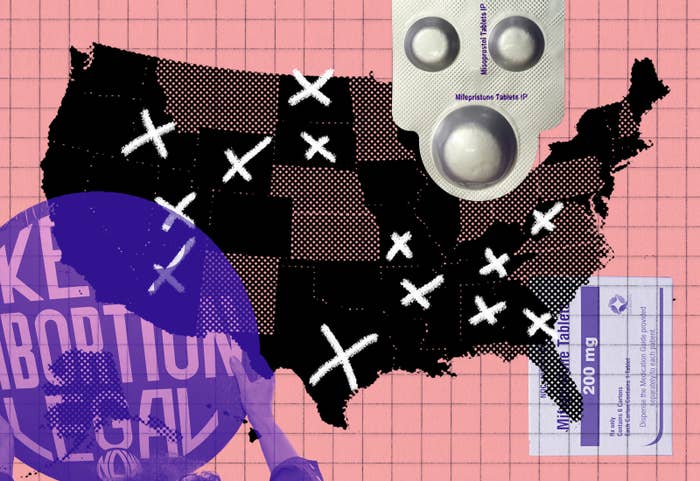
Getting an abortion will be more difficult and even illegal in large swaths of the US now that the Supreme Court has struck down Roe v. Wade, allowing states to outlaw and even criminalize the medical procedure.
Though it was already challenging to access abortion in many parts of the country, the Supreme Court’s decision on Friday will drastically alter the nationwide legal landscape for reproductive rights. With Roe, the landmark 1973 decision that legalized abortion in the US, out of the way, 26 states are expected to eliminate or severely restrict abortion access, according to the Guttmacher Institute, a sexual health and reproductive rights research and advocacy group that tracks state legislation. Of those, 13 states, including Texas, Wyoming, Oklahoma, and Mississippi, have so-called trigger laws, which are designed to take effect now that Roe has fallen or through quick state action.
Abortion is still legal in at least 16 states and the District of Columbia, and medication abortions, which have grown to account for more than half of all abortions in the US, also continue to be an option early in pregnancy. But with anti-abortion lawmakers passing or contemplating even more restrictions and penalties for traveling out of state or using mail-order pills to end a pregnancy, it may be confusing to know whether you could face any legal risks for having an abortion.
BuzzFeed News talked to five legal experts and reproductive rights advocates about how to get an abortion in a post–Roe world and what you should know about the potential legal risks of ending a pregnancy in a state where the procedure is outlawed or severely restricted.
“The first and foremost thing I want everybody to know is that they are not alone, and there’s an entire ecosystem of support for people,” said Farah Diaz-Tello, senior counsel and legal director at If/When/How, a legal advocacy group dedicated to reproductive justice. “This is scary and it’s legitimate to feel afraid, but I also want [people] to feel resourced and supported.”
Is abortion still legal where I live?
Now that Roe is gone, state laws banning abortion outright or early in pregnancy are now constitutional. To find out the current status of abortion in your state, experts and advocates recommended several websites, including abortionfinder.org, abortionfunds.org, and ineedana.com, which should have up-to-date information about whether and when abortion is legal in your area and where to access care.
The Center for Reproductive Rights and the Guttmacher Institute also maintain maps and other webpages that track state legislation on abortion rights. You can also contact your local abortion clinic or abortion fund, which will have the best information about what kind of care is available.
“All abortion providers across the country, whether it be Planned Parenthood or independent providers, are prepared for this,” said Dr. Meera Shah, chief medical officer of Planned Parenthood Hudson Peconic in New York and medical director of the Whole Woman’s Health Alliance clinic in South Bend, Indiana.
What are my options if abortion is outlawed in my state?

If abortion is illegal or inaccessible where you live, you generally have two options: travel to a state where the procedure is protected or self-manage an abortion using medication at home.
People have been safely accessing care both ways for years. In the wake of Texas’s six-week ban taking effect in September 2021, thousands of Texans have obtained abortions out of state, according to the University of Texas at Austin’s Texas Policy Evaluation Project. And in 2020, medication abortions accounted for more than half of all abortions in the US, according to the Guttmacher Institute.
“It’s just going to be a broader application of what we already see happening to many people,” Diaz-Tello said.
If you need help covering the costs associated with traveling out of state for care, your local abortion fund can provide financial support for childcare, airfare, lodging, gas, and other expenses, said Emma Hernández, a spokesperson for the reproductive justice nonprofit We Testify.
“They can also drive you to your appointment itself, pick you up from an airport, provide you perhaps a place to stay depending on the need that you have and what’s locally available,” Hernández said.
Is it safe to travel across state lines for an abortion?
Yes. People have traveled across state lines — and across the country — to get abortions for decades. There has been talk among anti-abortion legislators of trying to prevent people from leaving their states for care or punish them when they return, but there are currently no laws on the books that would allow them to do so.
“We’ll have to see which states pass those kinds of laws and how they actually go into effect — they're certainly going to get challenged,” said Aziza Ahmed, a law professor at the University of California, Irvine.
Generally, if someone commits a crime in one state but goes to another, there is an expectation that the second state would hand that person over to the jurisdiction where the crime was committed, Ahmed said. But whether a state could prosecute someone for committing what it considers to be a crime in another jurisdiction where the same act is legal is unclear.
“We’re not sure how this is going to play out,” Ahmed said.
Anti-abortion lawmakers, though, will certainly try to prosecute people who travel for abortion care, even if it’s unclear if they have the legal authority to do so, she added.
“The states have already proven themselves to be extremely cruel and indifferent to people’s lives,” Ahmed said. “I think they’re going to try to prosecute people and then they’re going to wait for the challenge and … destroy people’s lives while they’re doing it to scare everyone.”
Meanwhile, states where abortion remains legal have been working to shore up protections and provide more assistance for people who travel there for care. In May, Connecticut Gov. Ned Lamont signed a bill into law that prohibits state officials and health providers from cooperating with lawsuits waged against patients who travel to Connecticut for the procedure. Other states, like California and New York, are considering similar legislation along with other measures.
And on Friday, President Joe Biden vowed to protect anyone who needs to travel for abortion care.
"As the attorney general has made clear, women must remain free to travel safely to another state to seek care they need," Biden said. "If any state or local official, high or low, tries to interfere with a woman exercising her basic right to travel, I will do everything in my power to fight that deeply un-American attack. "
What is medication abortion and how can I get the pills?
Medication abortion is a nonsurgical procedure that involves taking a combination of prescription medications called mifepristone and misoprostol to end a pregnancy of up to 11 weeks. Mifepristone blocks progesterone, the hormone needed for a pregnancy to continue, and then misoprostol causes the uterus to expel its contents.
The method has been widely tested, has a high success rate, and has resulted in very few incidents of hospitalization. The medications are approved by the FDA, which allows healthcare providers to administer the pills in person or send them to patients by mail, but several states have adopted laws restricting how the medications are dispensed (more on that later).
Plan C provides state-by-state information on how to access medication abortion — and the potential legal risks you may face — where you live. Organizations like Abortion on Demand, Aid Access, and Hey Jane provide the pills by mail. The Miscarriage and Abortion Hotline helps people navigate how to use the medications on their own. If/When/How’s Repro Legal Helpline, which can be reached by phone at 844-868-2812 or online via reprolegalhelpline.org, is also a resource for people seeking secure and confidential legal guidance on how to self-manage an abortion.
“If folks aren’t able to travel, which is the majority of people living in these states, this is going to be a really important point of access for them,” Shah said.
Biden said on Friday that he was directing the Department of Health and Human Services "to take steps to ensure these critical medications are available to the fullest extent possible."
Is it legal to use medication abortion?
The answer to this question is a bit more complicated, Diaz-Tello said. While only three states — Oklahoma, South Carolina, and Nevada — currently have laws criminalizing self-managed abortion, many more have adopted laws restricting access to medication abortion. According to the Guttmacher Institute, 19 states prohibit the use of telemedicine to prescribe medication abortion, and 32 states require clinicians who administer the pills to be physicians, rather than nurse practitioners or other licensed medical professionals.
And while anti-abortion lawmakers and advocates claim restrictions on abortion are not intended to criminalize the pregnant person, people have been prosecuted for ending their own pregnancies. In April, a 26-year-old Texas woman was arrested and charged with murder for being involved in a “self-induced abortion.” She was later released and prosecutors acknowledged she did not violate any laws.
“It is possible that you could be violating the law by using medication abortion if there’s a law that says they will actually prosecute pregnant women or if it’s gray enough,” Ahmed said. “As we all saw in Texas, they already tried to do that.”
But given that medication abortion is FDA-approved, experts said it’s still unclear whether states’ restrictions on access are even legal.
“Unfortunately, I think it’s one of those things where we can’t really know the answer until there is a legal challenge,” Diaz-Tello said.
How can I protect myself against prosecution?
One important thing to know is that healthcare providers wouldn’t be able to tell if you’re having a miscarriage or a medication-induced abortion when taking the pills orally, so experts said it’s not necessary to share that information with hospital staff in the event you needed to seek medical attention.
“There’s no difference between a prompted miscarriage and one that occurs spontaneously, and there’s no difference in the care that they would seek,” Diaz-Tello said. “The pills themselves are not clinically relevant.”
However, when taken intravaginally, the pills can leave residue, said Dr. Ghazaleh Moayedi, an obstetrics and gynecologist who provides abortion care in Texas. Moayedi said it feels wrong to tell people to only use medication abortion orally, noting that taking it intravaginally can reduce some of the side effects of the drugs, like diarrhea, and can be good for people with certain medical conditions. Still, she agreed that people who are accessing pills “in a clandestine fashion” should take them orally for that reason.
“I don’t want to live in a country where we have to tell patients to lie to their healthcare providers to be safe,” Moayedi said. “But also people are telling on you. ... We need to be careful.”
To protect yourself from criminalization, you should also just generally be cautious about whom you share personal health information with, Diaz-Tello said.
The Repro Legal Helpline also recommends using a VPN to hide your internet search activity and encrypted messaging services like Signal to protect your private conversations. When people are prosecuted for self-managing an abortion, law enforcement can gain access to their phones and computers and use information gleaned from those devices.
“This isn’t something that’s unique to prosecutions related to self-managed abortion,” Diaz-Tello said. “This sort of law enforcement intrusion into people’s private data has been relatively commonplace.”
